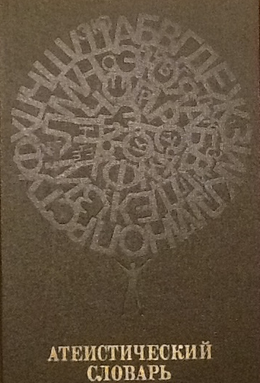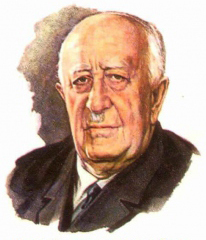
The Russkaya Pravda was the legal code of Kievan Rus' and its principalities during the period of feudal fragmentation. It was written at the beginning of the 12th century and remade during many centuries. The basis of the Russkaya Pravda, the Pravda of Yaroslav, was written at the beginning of the 11th century. The Russkaya Pravda was a main source of the law of Kievan Rus'.
Oleg Nikolayevich Trubachyov was a Russian linguist. A researcher of the etymology of Slavic languages and Slavic onomastics, he was considered a specialist in historical linguistics and lexicography. He was a Doctor of Sciences in Philological Sciences, an academician of the Russian Academy of Sciences and served as the editor-in-chief of the Etimologiya yearbook. His works are on the etymology of Slavic languages and on East Slavic onomastics.

Sergey Semyonovich Nametkin was a Soviet and Russian organic chemist, a prominent researcher in terpene chemistry, the cracking of petrochemicals, and rearrangement of camphenes. Academician of the USSR Academy of Sciences. Winner of two Stalin Prizes.
The Academy of Sciences of Turkmenistan is a state body in Turkmenistan founded in 1951, which is responsible for the implementation of Turkmen scientific and technical policy. The academy was closed under president Saparmurat Niyazov and reopened by his successor, Gurbanguly Berdimuhamedow.

Alex Battler, known in Russia under the pen name Oleg Alekseyevich Arin, is a Soviet-born Russian-Canadian scholar and political writer. He is a member of the organization «Defend Science» (US).
Vladimir Semionovich Spirin was a Russian philologist, sinologist, historian, primarily interested resided in classical Chinese philology and Chinese philosophy. Throughout his career he was a lecturer of Saint Petersburg State University, researcher at Saint Petersburg's branch of the Institute of Oriental Studies of the Russian Academy of Sciences, Saint Petersburg Russia, Candidate of Sciences.

Yuriy Ivanovich Semenov was a Soviet and Russian historian, philosopher, ethnologist, anthropologist, expert on the history of philosophy, history of primitive society, and the theory of knowledge. He was also the original creator of the globally-formation (relay-stadial) concept of world history and is a Doctor of Philosophy, Doctor of Historical Sciences (1963), and Professor. He was Distinguished Professor at the Moscow Institute of Physics and Technology.

Atheistic Dictionary is a one-volume reference work devoted to various aspects of religion and atheism. It contains more than 2,500 terms.

Vsevolod Ivanovich Romanovsky was a Russian, Soviet and Uzbek mathematician, founder of the Tashkent school of mathematics.

Aladdin Allahverdiyev is an Azerbaijani scientist and professor (2001). Soviet, Russian and Azerbaijani scientist in the field of mathematical models development and methods of studying wave and oscillatory processes to create piezoelectric devices and products used in the world's oceans and space studies, in marine seismic exploration, in electronic, defense and medical industries.
Anatoly Vasilyevich Belov was a Soviet religion scholar and atheist propagandist. He was a First Deputy Chairman of the Council for Religious Affairs under the Council of Ministers of the USSR, an expert on Adventism and one of the authors of the Atheistic Dictionary and Atheist Handbook.
Maria Sidorovna Butinova, née Dolgonosova, was a Soviet and Russian ethnographer, historian, and religious scholar. As a doctor of historical sciences, she was a specialist in the field of religion of Oceania.

Vladimir Kapitonovich Nikolsky was a Soviet historian, ethnologist, translator, religious scholar, Doctor of Historical Sciences (1943), and professor.

Derevenskiy Bezbozhnik was an illustrated magazine, an organ of the Centre Soviet and Moscow Oblast Soviet of the League of the Militant Godless.

Vladimir Konstantinovich Soldatov was a Russian and Soviet ichthyologist, zoologist, Doctor of Biological Sciences, professor of the Department of Ichthyology of the Moscow Technical Institute for the Fishery Industry.

Henri Amvrosievich Rukhadze was a Soviet and Russian physicist. Doctor of physical and mathematical Sciences, professor, laureate of State Prizes (twice) and M. V. Lomonosov Prize. Author of more than 600 published works, including more than 55 reviews and 14 monographs. He has trained 66 candidates and 32 doctors of sciences. The Hirsch index is 19.
Galina Stepanovna Nikitina — Soviet lawyer and orientalist, Candidate of Juridical Sciences (1953), Doctor of Historical Sciences (1977), author of the book «The State of Israel» – the first monographic study in Soviet literature of the history and economics of the state of Israel.

Alexandr Viktorovich Chudinov is a Soviet and Russian historian, Doctor of Sciences in Historical Sciences (1997), works in Institute of World History, Russian Academy of Sciences. Alexander is a specialist in the history and historiography of French Revolution and Napoleonic Wars, social thinking of France, Britain and Russia, international relations. He is a member of the International Commission on the History of the French Revolution and is one of the authors of the Great Russian Encyclopedia and The Cambridge History of the Napoleonic Wars. Alexander has also authored manuals for students.
Ninel Grigoryevna Artsimovich also transliterated Arzimowitsch was a Soviet, Russian professor, doctor of medicine and immunology. She received the award of Honored Scientist of the RSFSR (1990). Her husband was Lev Artsimovich.
Anatolyi Kapitonovich Boldyrev was a Russian scientist, crystallographer, mineralogist, mathematician, doctor of geological and mineralogical sciences, and a professor of the Leningrad Mining Institute. His works are currently used while searching for ore minerals.













